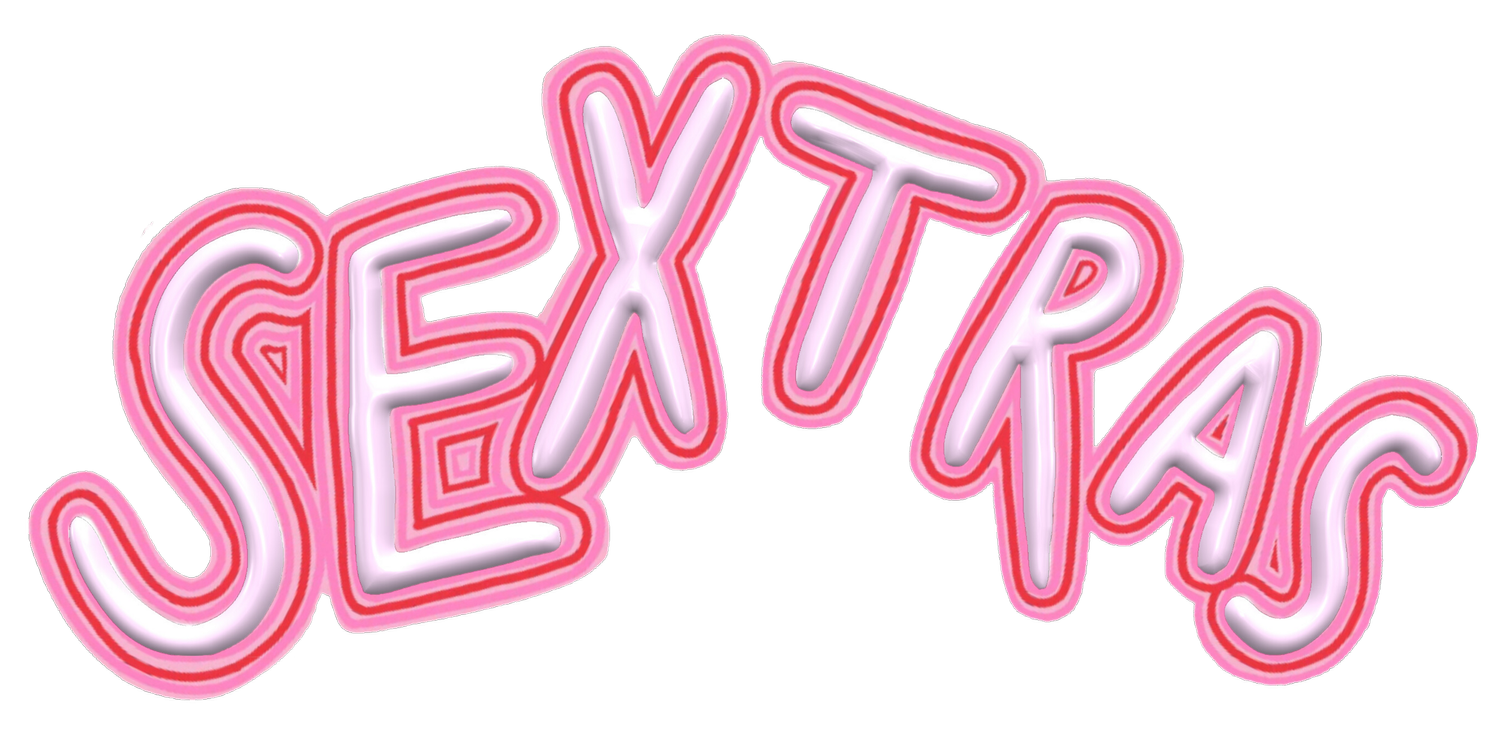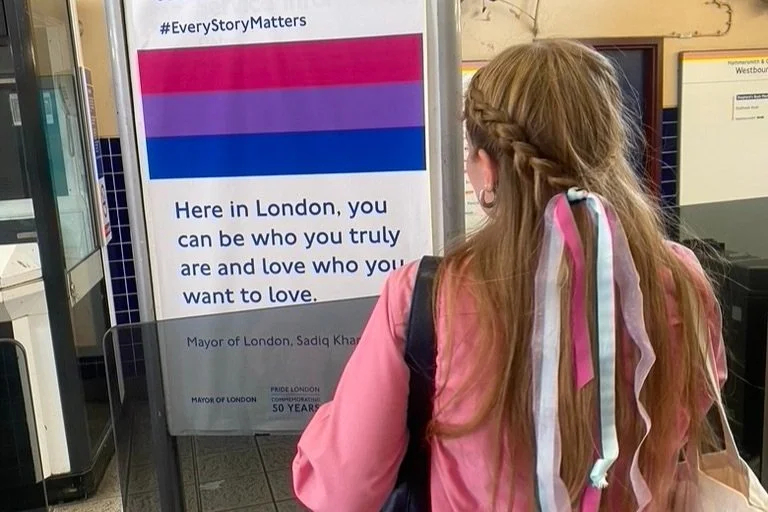Straight until proven bi: why bi women mainly date men
The words ‘Oh, so you’re straight now?’ likely incite a fight or flight response in any bisexual woman, particularly those who have mainly dated men.
Most women who identify as bisexual will have at some point been the subject of jokes, pointed asides and, in some cases, straight out denial that bisexuality exists among their friends, family, potential partners and even the wider LGBTQ+ community.
This constant casual erasure of their existence can lead to them feeling invalidated in their own identity. This is the case for Ellie*, 23, who tells Sextras: “I almost feel like an imposter labelling myself as bi, which is so fucked”.
At school and at university Ellie dated and slept with women, but she has now been in a relationship with a man for the last three years. Knowing she has the privilege to be able to move through the world presenting as straight, Ellie feels bad to take up space in the LGBTQ+ community.
“There are so many very real things that impact people who are in relationships with somebody of the same sex on a daily basis, from microaggressions to very real aggression, that don’t apply to me, so I feel like an imposter,” she says.
She attributes part of this feeling to not wanting to take up space for other people who are more impacted by biphobia and homophobia. But it’s left her feeling disconnected from her bi identity.
“I’m not really connected to being bisexual anymore, I don’t think about it because I don’t look at strangers and think, ‘you’re hot’. I think part of the problem is I don’t see a relationship after the one I’m in, I want to spend the rest of my life with my boyfriend. And because I’m dating a man I don’t have to explain who I am, I don’t need the label in a way.”
But any privilege that comes with being ‘straight passing’ comes with its own catch. Ellie admits she is less able to fit into both straight and gay spaces because of her sexuality being less visible, while also still feeling like she has to justify that – even though she is currently in a relationship with a man – she is still bi.
Discourse around the validity of bisexual women in relationships with men has become particularly loud on social media as of late. Even within the LGBTQ+ community, people question whether bi women should bring their boyfriend to pride, or if there’s any place for them at a Chappell Roan concert.
“I hate straight-passing discourse,” Lake Shearing, senior sex and relationships writer at Cosmopolitan, founder of the Bi Survivors Network and author of Bi the Way: The Bisexual Guide to Life, confesses to Sextras.
“As someone who is gender fluid and who looks like a soft butch woman, this idea that I’m passing easier than femme lesbians is just not the case,” they say. “The idea that bi women can ‘pass easier’ is very reliant on the stereotype that all bi women are gender conforming, that all bi women are femme and skinny and have boyfriends, which is definitely not the case.”
Having a standardised concept of what a bisexual person looks like, and how that informs who they date or sleep with, is making life more difficult for all of us, it seems.
For those who, unlike Ellie, haven’t slept with a woman before, the narrative around straight until proven bisexual can invoke denial around their attraction to women and make them feel like women are a distant, unattainable feat that is totally out of their reach.
Cassie didn’t realise she was bisexual until later in life. A formerly strict Christian, she remained a virgin until she married a man at 25.
“I'd been with my husband for 18 years and we have a nine-year-old together – my husband was the only partner I had ever had,” Cassie says.
“But then one day I was in the pool with my best friend. She came up behind me, wrapped her arms around me, and whispered in my ear. This feeling of butterflies and electric shock just went through me and I hadn’t felt that in a long time.
“I held her arms on my chest, held on to her hand, and I said ‘Do you feel this?’ She said, ‘Yeah, I do,’ and she laughed, pulled away, and splashed me with water.”
“It was a very playful moment. I was 39. I'm not some giggly school girl, but that's what I felt like at that moment.”
Despite acknowledging their attraction to one another, Cassie and her best friend chose not to take their flirtation any further than hand-holding and phone calls, as both were in monogamous relationships with their husbands. Eventually, Cassie felt she had to tell her spouse about their deepening connection.
“It started to feel like cheating, even though nothing had really happened,” she says. “So I told him I was bi and was starting to fall in love with my best friend. And he was like, ‘I know.’ I was like, ‘Sorry? How do you know?’ Because I didn't even know until that moment.”
Her husband told her she could explore her sexuality by having relationships with other women – though not with men. Cassie decided to open their relationship up to allow him to sleep with other women, too, even arranging an encounter between him and one of her friends.
Ultimately, Cassie’s husband told her it wasn’t working for him, and she admitted she no longer felt attracted to him. They decided to end their marriage, with their divorce going through just one month ago.
Now, at 40, Cassie is navigating dating after coming out and realising that she needs to have an emotional connection to someone to find them attractive. But other people’s invasive opinions are sometimes a barrier to her dating life.
“People are like, ‘Are you sure you’re bi? Are you sure you’re not just experimenting?’ Especially coming out later in life, I’ve been asked if I’m just going through a midlife crisis. A lot of people have a lot to say. But at the end of the day, if you have the attraction, that’s what determines if you’re bi.
“I am attracted to men and women. How deep that connection goes depends on what it ends up meaning to me, and I don't have to justify that to you. It’s not something I have to prove.”
Similar to Ellie, Cassie acknowledges the dissonance between what you know is true and how you act – that is, believing you shouldn’t have to prove your sexuality through your dating history, but still feeling inclined to do so.
“Sometimes it feels like you have to prove your queerness in a way. Like, are you enough? Are you sure? It does get frustrating, and you get it from both sides – from the queer community and from the straight community. It’s hard to explain my identity when someone automatically assumes I’m hetero because I was with a man for so long.”
Alice Lovegood, a sex educator and conscious kink practitioner, who runs the Better Sex blog on Instagram, agrees this interrogation of bi women’s sexuality can come from both straight and LGBTQ+ people.
“Coming out later in life, I’ve been asked if I’m just going through a midlife crisis – a lot of people have a lot to say”
“If you're bi, and you're living in a cis-het relationship, you have that passing privilege, so you don't receive the same level of alienation from homophobic people,” she says.
“But then, you also feel alienated from the queer community sometimes.”
As a bi woman herself, in an ethically non-monogamous marriage with a man, Lovegood has personally experienced a range of struggles when dating people from different groups.
“My preference is women, which men often sexualise rather than take seriously,” she says. “I also find there can be resistance from lesbian women I date, because they think you're going to try to use them as an extra.”
“Then, if I'm dating a bi woman, I sometimes feel that I'm not living up to what a man could do, or they would prefer a man. There can be this uncertainty of what sex means to them, if they’re used to sex meaning penetration.
“You start to analyse yourself, like, ‘Oh, am I queer enough for this? If I'm living in a het relationship, or if I'm not dating a woman currently, do I count?’.”
Why bisexual women feel imposter syndrome
Statistically, bisexual women have a much smaller pool of women who they can date than men.
Content creator and author, Elspeth Kirkman, did some “bisexual maths” to ascertain how it is possible for 90% of bisexual people in relationships to be in a relationship with someone of the opposite sex.
She determines that in a room of 50 women and 50 men, a bisexual woman would have the choice of 49 (straight) men and three (bisexual or lesbian) women to date, meaning there is only a 6% chance you’ll end up with a woman, assuming you find all of them attractive. To make it as likely you’ll like the women in the room as the men in the room you would have to like women 17 times more, by Kirkman’s calculations.
Despite the odds literally being stacked against them, bisexual women often feel imposter syndrome for not being ‘gay enough’ or ‘straight enough’.
Shearing explains that this makes bisexual women feel like they have to showcase their dating history to prove their sexuality.
“Bisexual erasure, definitely this idea that bisexuality is immature and you’ll grow out of it or that it’s not a real sexuality, leaves us feeling like we have so much more to prove than straight people and gay people. A lot of women who identify as bi who haven’t dated or slept with other women can really feel like they’re not believed,” they say.
“But what I always used to say before I had dated or slept with a woman was we don’t ask people who think they’re straight who haven’t had sex yet, ‘well, how do you know? Why are you identifying like that?’ So, why are we asking queer people that?”
Lovegood says that judgement from others is often linked to deep-rooted heteronormativity – the idea that straight relationships and interactions are ‘the norm’.
“If you think about how we learn, which is through what we see, what we experience, what we do, even down to what we see on TV, we're almost provided like a script on how hetero relationships work,” she explains.
This “script” also impacts how queer people feel internally. Lovegood notes that bi women, including herself, can struggle to navigate queer dating when it’s so different to their existing knowledge of what a relationship looks like.
“It's generally the man that hits on a woman and we're used to that,” she says. “Which means then when you’re trying to navigate a girl-girl relationship, you don't always understand the nuances of it. Who hits on who? Does she just want to be my friend? And I think that leads to natural anxiety and fear.”
Add patriarchy to bierasure and heteronormativity, and you’ve got the perfect cocktail for fearing the pursuit of women. Shearing explains that women are often viewed as something to be conquered, which can contribute to the feeling that dating a woman is a far higher mountain to be hiked than ‘conquering’ a man.
“There’s this misogynistic idea that women are difficult to flirt with or difficult to ‘get to sleep with you, get to date you’. I think that’s a very patriarchal way of looking at it that views women as something to be conquered and that sleeping with or flirting with a woman or even making out with a woman is an achievement, it’s something you’ve overcome,” they reflect.
“So I think firstly examine why you think flirting or dating other women is difficult, beyond homophobia.”
When you think about how the patriarchy impacts our own body image as women, that only translates onto women we’re attracted to or our sexual partners.
Consider how many times you’ve heard that vaginas smell or taste like fish, or that period blood is gross or picked up that it’s something to be ashamed of. (This isn’t even to mention that women’s bodies and pleasure are almost completely ignored from sex education.)
“There’s this misogynistic idea that women are difficult to flirt with or to get to sleep with and date; that’s a very patriarchal way of looking at it”
“Another issue that same-gender attracted women experience is we’re told vaginas are disgusting – not that all women have vaginas. That’s another thing people might be worried about is what women’s bodies are actually going to be like to have sex with.”
And once again the science shows this has a real impact on bisexual women’s self-esteem and body image – a 2023 study showed bisexual women have more body dissatisfaction than gay men and lesbian women.
However, a 2019 study suggested those who felt they were “successfully” navigating the norms and pressures of the straight and gay communities had a greater appreciation for their bodies, which suggests engaging with your community can have a positive impact on how you perceive your identity.
How to connect with your bisexuality, whether you’re single or in a relationship
You might be reading this thinking, ‘Okay Sextras…so what you’re saying is, I’m doomed? Sleeping with/dating a woman is already hard enough and now I have to overcome the patriarchy, homophobia and bierasure all by myself?’
Fear not! There is plenty you can do. Offering advice to bi women who are keen to date girls for the first time, Lovegood says: “Use specific dating apps that are catered for the kind of encounters you're seeking and just be open with people about what you're looking for and where you're at, so that others don't need to project their opinion or their fears onto you.
“We get so obsessed with labels and their definitions that we stop doing the work in self acceptance and self growth. Sometimes it’s better to throw them out and just be what you are, where you are, wherever you're at.”
If you find yourself dating a woman who is worried you’d prefer dating a man, it’s all in how you pitch yourself, Lovegood adds.
“Just be like: ‘I'm so excited to be dating a woman, I've wanted this for ages, I’m just not sure how to navigate it’.
“If you're open with those feelings, rather than trying to hide them, that really helps. I always say to women I date now that I can get in my head about who initiates things. Then it's a conversation, and it can be a fun way of expressing your fears.”
Throwing out traditional definitions of sex can also help alleviate pressure and make it a more pleasurable experience.
“Sex does not mean penetration anymore, and it’s not all about orgasm – anything can be sex,” says Lovegood.
“It’s good to have conversations about it with your sexual partners, express your anxieties, get used to your pleasure and their pleasure, and just remove the script entirely. Sex could be a massage, sex could be playing with kink, it could be making out for an hour. Just have fun, and explore each other.”
Connecting with your sexuality isn’t limited to those who are single, Shearing adds. “Personally I think that labels like bisexual and lesbian are as much about who we feel in community with as our attraction. Remember your sexuality is not just about who you sleep with and who you date, it’s also about your community and how you’re being a part of that.”
Embracing that community can help those in relationships with men feel connected to their sexuality. “I know lots of bisexual women who are dating men who are super active in the queer community,” Shearing says.
“A good way of embracing that identity is to go to bisexual events in your area, get involved in community organising, just show up and do the work. A lot of the people I know who are in long-term relationships with men are really embedded in queer communities because they are doing community organising and activism.
No one ever asks them if they’re really queer because they’re so dedicated – which shouldn’t be the case, we should just be believed – but if you are looking to embrace your queer identity a bit more I think that’s a good place to start.”
They also point to books about queerness, queer history and bisexual history as a good place to learn more about your community and feel involved in it – such as the BiPan library.
It’s all worth it!
It might seem like a lot of work, but shedding these ways of thinking can be fulfilling.
“It’s just easier with women,” Cassie reflects. “They’re a lot more intimate on a natural basis, like hand-holding, caressing your hair, that sense of touch and familiarity. The way women touch you, or when their breath is on your neck, it gives me that weak at the knees feeling…”
Although she hasn’t been able to fully explore her attraction to women yet, Cassie is optimistic about the future.
“I want it to be organic, and I want the whole package. I'm not going to just settle for a one night stand, just for the sake of having the experience,” she says. “I want the whole thing, and I wouldn't settle for anything less.”


